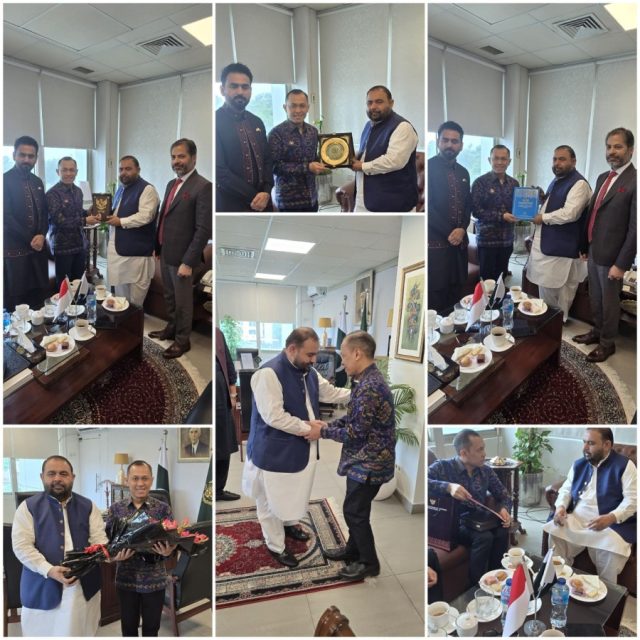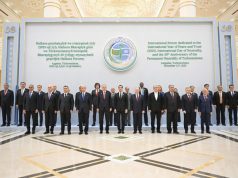ISLAMABAD, Thursday, July 24, 2025 (WNP): Pakistan and Indonesia on Thursday reaffirmed their shared commitment to deepening bilateral cultural ties through heritage preservation, people-to-people exchanges, and spiritual diplomacy — marking a new chapter in the longstanding friendship between the two nations.
The renewed resolve emerged during a meeting between Indonesian Minister Counsellor for Public Diplomacy, Rahmat Hindiarta, and Federal Minister for National Heritage and Culture, Aurangzeb Khan Khichi, held in Islamabad.
The discussion centered on promoting mutual understanding through the preservation of shared cultural legacies — particularly ancient Buddhist heritage — and fostering deeper institutional and artistic collaboration.
Highlighting the centuries-old connection rooted in spiritual and cultural traditions, both sides emphasized the need to translate historical goodwill into meaningful contemporary partnerships. A key focus was on preserving Buddhist archaeological sites in Pakistan, such as Taxila and Takht Bahi — which the minister said bear deep civilizational links to Indonesia’s Buddhist past, particularly in Bali and other regions known for their temple architecture and historical continuity.
Rahmat Hindiarta praised Pakistan’s cultural richness, especially the hospitality and spiritual warmth he witnessed at Sufi shrines in Punjab and Sindh. “The message of love and harmony I encountered at Sufi shrines resonates with our own values,” he remarked, while also lauding the internationally acclaimed taste of Multani mangoes as “a true treasure of taste.”
Rahmat proposed greater people-to-people contact through joint cultural festivals, tourism initiatives, and institutional linkages, stressing that “cultural diplomacy must advance hand-in-hand with economic cooperation to ensure sustainable bilateral progress.”
In response, Minister Aurangzeb Khan Khichi warmly welcomed Indonesia’s proposals and acknowledged the country’s steadfast support during critical moments in Pakistan’s history, including the 1965 war. He reaffirmed Pakistan’s desire to cultivate closer cultural and religious ties with Indonesia, calling it a “brotherly Muslim nation bound by history, faith, and friendship.”
He announced the establishment of a Buddha Heritage Centre in Islamabad to promote Pakistan’s ancient Gandhara civilization and attract religious tourism from countries like Indonesia. He also shared that the government is simplifying visa procedures to facilitate academic and spiritual visits.
The Minister revealed that Pakistan has already signed cultural cooperation MoUs with nearly 90 countries and expressed readiness to initiate a similar framework with Indonesia. Both sides agreed to begin work on fresh agreements focused on cultural exchange, joint heritage preservation, and artist collaboration.
In a gesture of goodwill, the Indonesian Embassy was invited to actively participate in the upcoming Lok Virsa Folk Festival in November. Minister Khichi encouraged Indonesian artists to perform and exhibit traditional music, dance, and handicrafts, offering the Pakistan National Council of the Arts (PNCA) as a platform for their cultural expressions.
To institutionalize collaboration, both sides agreed to appoint focal persons to coordinate efforts — including the digitization and archiving of rare photographs and historical documents showcasing the long-standing cultural links between the two nations.
The Federal Minister lauded the Indonesian Embassy’s initiative to set up an “Indonesian Corner” at the National Library of Pakistan, calling it a valuable step in enhancing cultural literacy and mutual understanding.
Reaffirming Pakistan’s commitment to safeguarding the cultural and religious heritage of all communities, Minister Khichi emphasized that minorities in Pakistan enjoy full constitutional rights. He noted that the country is steadily moving toward greater cultural openness, inclusion, and development.
The meeting concluded with the exchange of traditional books and gifts as symbols of friendship and mutual respect. Also present was Usman Shah, CEO of the Niftysphere Institute of Arts and Design, who expressed keen interest in facilitating creative collaborations between Indonesian and Pakistani artists in the future.
This meeting marks a promising trajectory in Pakistan-Indonesia cultural diplomacy, blending historical reverence with forward-looking collaborations that may redefine how heritage is leveraged for soft power and mutual prosperity in the region.




